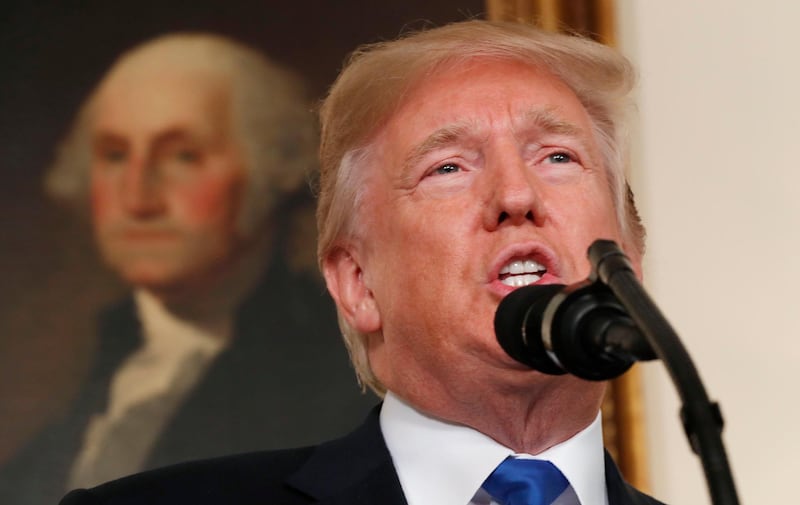On Friday, Donald Trump announced the most consequential foreign policy decision yet of his young presidency. In a no-holds-barred speech, the US president declared that he would not make the certification that Iran has complied with the terms of the Joint Comprehensive Plan of Action (JCPoA), the self-wounding deal negotiated in 2015 by the United States, China, Britain, France, Russia and Germany with the apparent aim of stopping Tehran from acquiring nuclear weapons. Mr Trump began with a chronological audit of Iran's vicious history since the country's seizure by self-serving extremists in the so-called "Islamic revolution" of 1979.
The terrorist footprint of Tehran and its proxies extends from Africa to Afghanistan, and there is barely a place in the Middle East that hasn't at some stage been a victim of Iran's actions. The ruins in Syria are a testament to the world's failure to hold Iran to account. Mr Trump, unlike his predecessor, refused to turn a blind eye to Iran's bloody history. And, unlike supporters of the nuclear deal, he refused to overlook Iran's continuing support of terrorism to keep alive what he called "one of the worst and most one-sided transactions the United States has ever entered into". It was a bargain which called for rewards to be doled out before actions were undertaken. Iran is as much a rogue state today as it was before the nuclear deal. The only difference is that, thanks to the nuclear deal, it is a richer and more powerful rogue state.
_________________
Read more
[ Trump threatens to terminate Iran deal ]
[ Arab countries welcome Trump's 'firm' speech on Iran ]
[ The nuclear deal has failed to curb Iran's weapons programme ]
_________________
The JCPoA has produced among its other signatories delusions so powerful that, in their quest to preserve the deal, they are neglecting the agreement's manifest failure to usher in "regional and international peace and security" and, worse still, to stop Iran from acquiring nuclear weapons. As Mr Trump clarified, Iran has on at least two occasions exceeded the limit of 130 metric tons of heavy water. In August, the chief of Iran's Atomic Energy Organisation declared it would take just five days for his country to "resume 20 per cent enrichment" of uranium. How is this possible if Iran has adhered to the terms of the nuclear deal?
To certify that Iran has complied with the nuclear deal in spite of such glaring questions would be to engage in deadly self-deception. Mr Trump, stopping short of pulling the US out of the deal, left no room for any doubt: if the US Congress and other parties to the JCPoA don't revise it, he will terminate it. From Saudi Arabia to Yemen and Bahrain to the UAE, countries that have long been victims of terrorism emanating from Tehran welcomed Mr Trump's resolve. As Anwar Gargash, UAE's Minister of State for Foreign Affairs, put it, the "premise that the JCPoA would moderate Iran's policy has been a total falsehood". Mr Trump sees this. Others should open their eyes before it's too late.
Follow The National's Opinion section on Twitter





